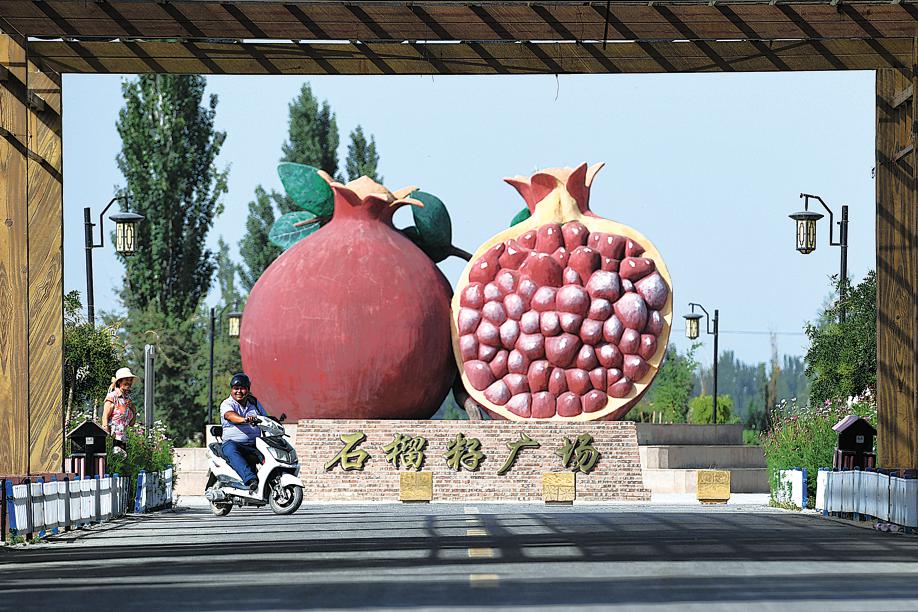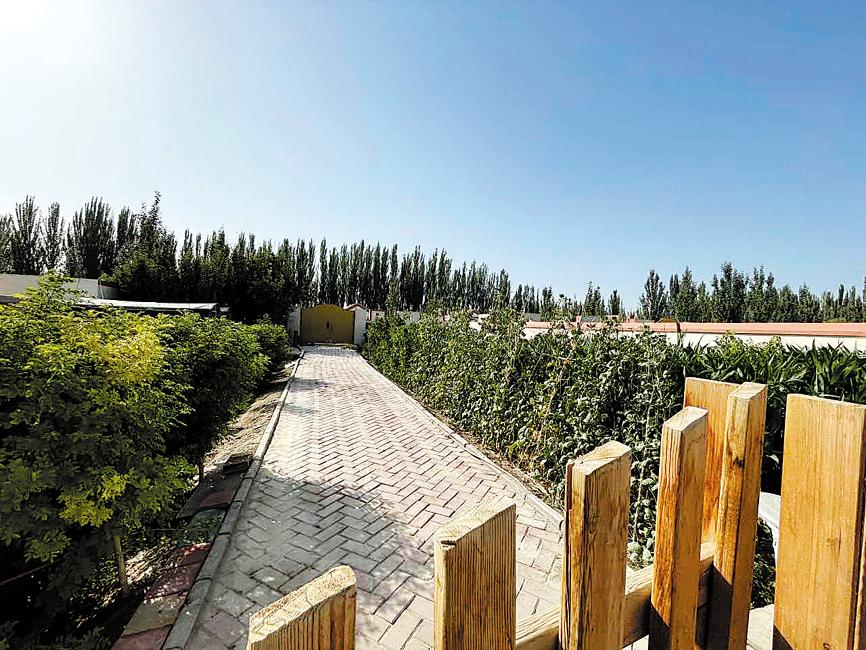
The families of Sun Zhibao (far left) and Ahmat Kerim (second from left) enjoy time together.[Photo by Xing Wen/Wei Xiaohao/China Daily]
The white apricot that grows in abundance and flourishes in Kuqa, Aksu prefecture in the Xinjiang Uygur autonomous region, has become a local specialty.
It's a tradition for Sun Chengzhong and Wang Fuxiang, villagers in Kuqa, to grow the apricots in the yard and treat their guests to the plump, deliciously sweet ones in early summer when the fruit is at peak harvest stage.
By some quirk of fate, the fruit has also brought the couple a valued familial connection with someone who is unrelated to them by blood and even of an ethnicity different from theirs.
The story began more than four decades ago.
One day in 1978, an intruder snuck into the couple's yard to pick the white apricots and wolf down the fruit, one after another. He was soon caught by the owners. The intruder, Ahmat Kerim, 5, turned out to be a malnourished child at the point of starvation.
Ahmat and his mother suffered from poverty after his father died in 1976. The boy just wanted the apricots to fill his belly. He was treated to a bowl of savory noodles after the couple got to know the reason behind his deed.
"It's the most scrumptious noodles I've tasted in my life," recalls Ahmat, now 48.
After that, the couple started to offer him food to eat and clothes to wear. Wang, the woman, helped him to do laundry.

A sculpture of pomegranate seeds symbolizes the closeness of 56 ethnic groups in Sun's village in Kuqa.[Photo by Xing Wen/Wei Xiaohao/China Daily]
As Ahmat became a grown-up who chose to live on farming, the couple bought him tractors and other necessary tools. In 1995, he married a woman from Shaya county in Aksu. Sun and Wang gave him 5,000 yuan ($774) to hold the wedding and purchase new furniture.
"They treat me as their own child," says Ahmat.
Ahmat also shows filial love for Sun and Wang. It's part of his daily routine to take a 15-minute walk from his own house to Sun and Wang's to see if he could help with household chores. In 2008, Sun was injured in a car accident and in 2018, he suffered a severe stroke. Ahmat and his wife took care of Sun in hospital.
"I feel grateful that I have Ahmat as my elder brother," Sun Zhibao, 42, the son of Sun Chengzhong and Wang, says.
He has two sisters, with one working in Korla and the other in Alaer. He used to work in Tianjin and has returned to his hometown as a grassroots cadre engaged in the country's poverty-alleviation campaign.
"When I and my sisters didn't have time to nurse our father, Ahmat was there to help, taking care of the filial duty," says Sun Zhibao.
He and his parents have learned to speak Uygur fluently to better communicate with Ahmat and his wife. In their spare time, the family members often practice traditional Uygur folk dancing together in the yard, enjoying moments of happiness and intimacy.
Such scenes of ethnic unity are common in their village, which has 1,875 residents from different ethnicities, including Uygur, Hui, Kazak and Han.
"The sense of unity fostered among the residents has become part of the village's ethos," says Sun Zhibao, also the village's Party secretary.

The Sun family cultivates many plants in their yard.[Photo by Xing Wen/Wei Xiaohao/China Daily]
Grassroots effort
The past decade has witnessed the remote village's transformation. And Sun Zhibao is the one who propelled the change.
After graduating from Xi'an International Studies University, in Xi'an of Shaanxi province, in 2001, Sun worked in a travel agency in Tianjin as a Japanese interpreter for several years. Then, Sun's father asked him to return home to run a business that might help fellow villagers to embrace a better life.
"I had broadened my vision of the outside world and it was time for me to help lift my home village out of poverty," Sun says.
He went back in October 2008, and began to plant cotton on a dry area near his village. He was the first in the village to use drip irrigation and sowing methods on the field. His endeavors to cultivate cotton on barren land have inspired fellow villagers to follow in his footsteps. In 2014, he was invited to join the village's Party committee where he could help the villagers to get out of absolute poverty. Three years later, he was appointed the village's Party secretary.
It was also that year when the village met the turning point in its development.
In 2017, Zhejiang province's Ningbo city joined efforts to support his village in upgrading its infrastructure and agriculture sector.
"Ningbo government provided high-quality crop and fruit varieties for the villagers here to grow. Supermarkets and other outlets in Ningbo helped to sell our agricultural produce," Sun says.
The husbandry cooperative in the village is now raising 789 cows and more than 2,000 sheep. Last year, the village's collective income surpassed 3.08 million yuan.
Sun has been actively seeking talented, diligent young people to join him as grassroots cadres to push the village and nearby villages to the next stage of development.
"Young cadres with action and enthusiasm are important for rural vitalization," he says.
He plans to set up a fruit cultivation zone covering some 33 hectares in the village.
The white apricot is always there to grow.

Sun Zhibao exercises to rehabilitate himself after a stroke he suffered several years ago.[Photo by Xing Wen/Wei Xiaohao/China Daily]

